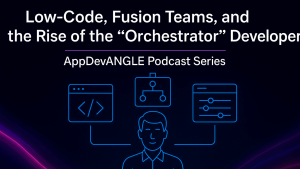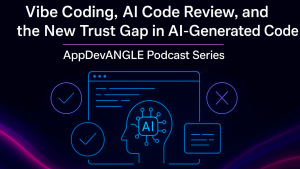ABSTRACT: PwC transforms enterprise operations through AI agents, agent OS, and secure architectures that scale with governance and impact. With a focus on productivity, automation, and real-time outcomes, PwC helps clients modernize systems and reimagine workflows. Its AI strategy combines human expertise, orchestration, and trust to deliver measurable ROI across industries.
The AI Imperative: A Strategic Moment for Enterprise Transformation
Artificial intelligence is no longer on the horizon; it’s reshaping enterprise operations today. As companies navigate economic uncertainty and the disruptive potential of generative AI, a clear signal has emerged: future competitiveness depends on the ability to intelligently apply, govern, and scale AI. At an event on May 15th in San Francisco, PwC’s leadership, including U.S. Chief AI Officer Dan Priest and Global and US Commercial Technology and Innovation Officer Matt Wood, has positioned the firm to meet this challenge through a foundational reinvention of how business performance, knowledge work, and human expertise intersect with intelligent automation.
As Dan Priest emphasized, AI is not a replacement for expertise. It’s an amplifier. This principle underpins PwC’s AI strategy, which is grounded in delivering operational value at scale, transforming legacy systems responsibly, and embedding AI across the business in ways that augment people, not replace them.
What Enterprises Are Asking For
Today’s enterprises are not asking for more tools but for outcomes. Clients want to modernize legacy applications without incurring unacceptable risk. They want to break free of siloed systems, drive continuous improvement from their existing infrastructure, and deploy secure AI agents that execute real work across business processes. Crucially, they seek to embed AI in a governed and scalable way, balancing flexibility and innovation with controls, oversight, and trust.
PwC’s clients are not alone in this ambition. According to PwC’s May 2025 AI Agent Survey, 88% of senior executives plan to increase their AI-related budgets over the next year, and nearly four in five (79%) report AI agents are already in use within their companies. However, the real opportunity lies ahead: just 35% say they’ve adopted agents broadly, and fewer than half have rethought how work will be fundamentally structured.
PwC’s Strategic Response: Architecting AI for Real Outcomes
To deliver what clients need, PwC developed a multi-layered approach centered around agent OS, an enterprise-grade operating system for intelligent agents. PwC’s agent OS is an agent orchestration framework built to work across all major cloud providers, such as AWS, Microsoft Azure, Google Cloud, model vendors, such as OpenAI and Anthropic, and enterprise applications, such as Salesforce, Oracle, SAP, and Workday. Agent OS provides a secure “switchboard” to connect, coordinate, and govern AI agents at scale.
A pivotal feature of agent OS is its integration with the Model Context Protocol (MCP), an emerging standard open-sourced by Anthropic, that allows agents to securely access external tools and data. This capability is critical as organizations shift from isolated pilots to full production deployments. MCP enables reusable, consistent agent-to-tool interactions, accelerating development and simplifying deployment. Agent OS governs these interactions from the start, backed by static code analysis, credential vaulting, and identity-based authorization.
The result is a framework that delivers the benefits of composability and extensibility without sacrificing enterprise-grade security, a key concern for the 34% of executives who identified cybersecurity as their top barrier to realizing AI agent value, according to the PwC AI Agent Survey.
From Concept to Reality: Enterprise-Wide AI Transformation
PwC’s approach is not theoretical. Internally, the firm has deployed more than 250 AI agents and 12,000+ custom GPTs, logging over 31 million GenAI interactions. Over 95% of U.S. employees have engaged in AI skill-building, clocking over 460,000 training hours and completing over 50,000 hands-on GenAI trainings.
This investment has translated into real productivity gains. For example, in software development, productivity improvements range from 20% to 50%; in finance, they are 20% to 40%; and in marketing, they are 20% to 30%.
PwC’s Clients’ results are just as compelling:
- Southwest Airlines modernized its crew management platform using generative AI. The business accepted 90% of AI-generated user stories to be developed, and planning time was reduced by half.
- Wyndham Hotels & Resorts improved brand standard review speed by 90% and reduced contact center handling time by 50%, leveraging AI agents to improve both the guest and owner experience across its franchise model.
- Cross Insurance automated document classification and quote generation, cutting quote handling costs by 20% and seeing 50% of inquiries fully managed by AI agents.
These projects underscore a key finding from PwC’s AI Agent Survey: among those already using AI agents, 66% report increased productivity, 57% report cost savings, and 54% report improved customer experience. They are seeing the ROI of AI.
Agent Powered Performance: Sense, Think, Act in Real Time
One of PwC’s latest offerings, Agent Powered Performance, exemplifies this strategic vision. Integrated with agent OS, it embeds AI agents directly into core enterprise systems like ERP and CRM. These agents follow a “Sense, Think, Act” model: they continuously monitor value leakage, reason over predictive models and benchmarks, and execute improvements directly inside operational tools.
For example, a finance agent may detect and fix billing anomalies before they hit the ledger, or a supply chain agent may reroute shipping to avoid cost spikes. The result is continuous value realization, not just transformation during change initiatives, but daily operational gains. Early adopters report measurable improvements within the first quarter of deployment, with compounding impact over time according to PwC.
Addressing the Human Factor
While the technology is mature, the real challenge lies in adoption and organizational readiness. The AI Agent Survey results reveal that while cybersecurity and cost are often cited as top concerns, the deeper barriers, such as employee adoption (14%) and organizational change readiness (17%), are more telling. At this point, only 42% of companies have redesigned workflows around AI agents, even as 50% expect their operating models to be “unrecognizable” within two years.
PwC addresses this gap through a holistic workforce strategy. With more than 3,200 AI champions and tailored training programs, the firm keeps human expertise at the core of its AI transformation. Agents are designed to augment, not replace, human workers, enabling staff to move from low-value tasks to strategic, higher-impact roles. Matt Wood noted at the event that “AI is driving the cost of programming down to zero, but the value of engineering and business problem-solving is going up.”
Looking Ahead: Multi-Agent Orchestration and Competitive Differentiation
What comes next? PwC sees multi-agent systems as the defining architecture for the next wave of enterprise AI. These systems enable agents to collaborate, including planner, executor, and auditor agents, working together toward shared business outcomes. Through agent OS, PwC aims to enable these designs in real client environments.
Yet the market is still early. Fewer than half of the companies in the AI Agent Survey are using agents to redesign operating models or create new products, but those who do are pulling ahead. Seventy-three percent of executives believe their use of AI agents will deliver a competitive advantage in the coming year.
Our ANGLE
We see that PwC is not just helping clients adopt AI, it’s helping them operationalize it, which we see as extremely important from not only a bottom-line perspective but a cultural and human perspective. Through the technology PwC produces, such as agent OS, secure MCP implementation and integration, and outcome-focused use cases like Agent Powered Performance, PwC offers a blueprint for scaling AI across the enterprise with confidence, speed, and measurable ROI. We believe this has the potential to be a unique and sustainable advantage for their clients. In an environment where organizations are still working through which processes to build agents around, PwC is not only supplying the advice and expertise, but also the technology to enable AI Agent success.
We see with its combination of engineering rigor, domain expertise, alliance partnerships, and enterprise-scale platforms, PwC is building not just agents but an agentic enterprise for its clients. For organizations serious about transforming work, not just digitizing it, PwC is a trusted innovator, ready to lead the way.
Feel free to reach out and stay connected through robs@siliconangle.com, read @realstrech on x.com, and comment on our LinkedIn posts.
(* Disclosure: TheCUBE is a paid media partner for the PwC. Neither PwC, PricewaterhouseCoopers International Limited (PwCIL), the sponsor of theCUBE’s event coverage, nor other sponsors have editorial control over content on theCUBE or SiliconANGLE.)



